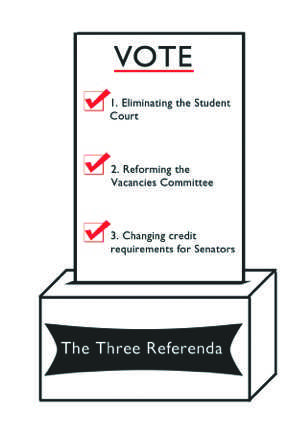Along with voting for their future Student Senators, students will also be voting on three referenda. Here’s what they are about.
Student Court
One referendum that the students will be voting on is whether or not to eliminate the Student Court, Treasurer and Chief of Staff Tyrel Zich said.
The Student Court was created in 2009 and was voted on by the student body in a referendum. Its responsibilities include providing independent review for Student Senate so it can efficiently and fairly offer rulings and conduct an annual review of Student Senate election procedures to make sure elections are taking place ethically. The Court is also meant to handle internal disputes of student organizations and the final appeals from Organized Activities.
Zich said the Student Court currently does not operate in the way it was meant to as there are Student Senate committees that exist and do these jobs already.
He called the current referendum a way to restore judicial powers to Student Senate.
“It’s taking something out of the constitution that’s not functional, but its purposes are already being fulfilled elsewhere in Student Senate,” Zich said.
The Student Court, as it is written in the Student Senate constitution, is meant to oversee Student Senate elections and make sure they are taking place ethically, though those issues are taken care of adequately by the Elections Committee, Zich said.
And when it comes to hearing violations made by student organizations and other problems that arise within student organizations, the Student Organizations Conduct Committee covers that, he said.
Sophomore AJ Lawton said he didn’t think eliminating the Student Court is the best idea.
“I’d say that if a judicial body exists to fill this role, it should take that role rather than a committee doing the work for it because they weren’t created for the specific purpose of overseeing those things,” Lawton said. “I would worry that these other committees would not be as accountable, then.”
However, Zich said with the Elections Committee and the Student Organizations Conduct Committee being in place, the Student Court becomes unnecessary.
“We asked ourselves if we have been doing all of those things in the absence of Student Court,” Zich said. “And the answer was ‘absolutely.’”
Zich said of the three referenda, this is the one he expects students to be most unsure about, though said the Senate has held a couple of discussions about it, and thinks that has cleared up some confusion.
On-campus Student Senator Jake Wrasse said when the referendum was first introduced in December, he at first had mixed feelings about it.
“It seemed like this was going to be less of a transparent process,” Wrasse said. “But it became very clear in the discussion that we had that the Internal Affairs Commission, which would take over this role, would be made less fully apart of Student Senate and would include more outside perspective.”
Wrasse said the Student Senate’s biggest concern with a decision like this was to make sure the student body was able to choose which they are most comfortable with.
Vacancies Committee
A second referendum will appear on students’ ballots on Monday which, if passed by the student body, would reform the makeup of who serves on the Vacancies Committee.
The Vacancies Committee appoints new Student Senators to the Student Senate when vacancies arise. The Committee fills vacancies with a majority vote from within the committee and is then approved by the entire Senate.
Currently, the committee is comprised of the Student Body President, the Student Body Vice President, one member of the Executive Board, one Off-Campus Senator, and one On-Campus Senator as outlined in the Student Body Constitution.
The referendum would change the committee’s membership to include the Student Body President, Student Body Vice President, and three Student Senators at least one of which must be an on-campus Senator.
Zich said he believes this would be beneficial for the student body because it makes sure they are being represented by those they elected.
“As it is now, the executive board member could possibly not necessarily be elected by the students,” he said. “So that’s a little problematic for us. We want to make sure the students decide the elected officials they’re represented by.”
Change in requirements to serve on Senate
The third referendum will change the credit requirement necessary for students to serve on the Senate.
As of right now, the Student Senate Constitution states that Student Senators need to be enrolled with six credits. This referendum would change the language of this requirement to say students need to be enrolled “half-time.”
While six credits is half-time for undergraduates, Zich said, for graduate students, that is full-time.
“We brought this up because a grad student said it was a little unfair to grad students,” he said.
Changing the language of enrollment requirements to read “half-time” would allow grad students enrolled with three or four credits to join Senate, Zich said.
Senior Megan Chilman said she thought this was a sound change and something she could understand people voting “yes” for.
“It would allow whoever wants to be a part of Student Senate to have that opportunity,” she said.
Zich said during his time on Student Senate, there have not been any graduate students who have served as Senators. However, he added, in order to serve on a committee within the Student Senate, the same enrollment requirements need to be followed.
Zich said he doesn’t foresee students having any problems with the referendum to adjust the language of enrollment requirements and suspects the student body will pass it.
If you have any questions about the referenda, you can stop by the Student Senate Office located in Davies Center 220 and speak to one of your Senators.













